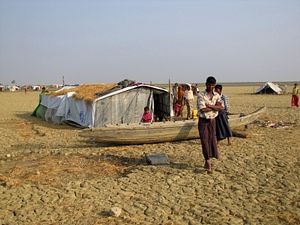The word genocide is a loaded term. Lawyers, human rights advocates, governments and militaries often spend too much time arguing the finer points of law over whether this crime had actually occurred in areas where there is no doubt that great atrocities took place.
In Cambodia, at the Khmer Rouge Tribunal, where Pol Pot’s former henchmen are facing charges of genocide, such arguments are being hotly contested. The expulsion of ethnic Chinese at the point of a gun by the Vietnamese in the late 1970s is another example.
The debate of what constitutes genocide continues to this day in regards to the massacre of communists by Indonesian authorities in the mid-1960s or their treatment of Christians in East Timor during its occupation three decades later.
Even harder to prove is in the Philippines, where President Rodrigo Duterte has been warned he risks committing a type of genocide after launching his war on drug dealers, with arbitrary killings now responsible for more than 6,000 deaths.
Ambiguities also exist in Myanmar, where the military’s persecution of the Muslim Rohingya population has been also labeled as a genocide by some. Lawyers might also argue against despite overwhelming evidence that gross atrocities have occurred since October when the latest round of violence erupted in northwest Rakhine state.
There, tens of thousands of Rohingya have been forced to flee into neighboring Bangladesh and with horror stories of murder, rape and torture.
But determining exact casualty numbers is impossible as journalists, human rights activists and independent observers have been banned from entering the troubled area by a government lead by the Nobel Laureate Aung San Suu Kyi.
Certainly hundreds, probably thousands, have died in recent years.
Yet an interim report from a commission set up by the Myanmar government and led by former general, Myint Swe, said there was not enough evidence to support widespread allegations of rape. Nor did it mention claims that security forces had been killing people.
Its final conclusions will be released before the end of January.
New York-based Human Rights Watch (HRW) slammed the report as flawed. It was released as a graphic video emerged. In it, police have lined-up members of the Muslim minority, forced them to sit and then beat them. The video renders denials of mistreatment as a major embarrassment for Swe and Suu Kyi.
HRW said the report was a “classic example of pre-baked political conclusions to assert the situation is not so bad, designed to push back against international community pressure.” The report noted that legal action had been taken against 485 civilians.
Importantly, the unwarranted and sometimes deadly treatment meted out to the Muslim Rohingya has, unsurprisingly, deeply upset the authorities and Muslim leaders in Indonesia and Malaysia, threatening a split with the ten-nation Association of Southeast Asian Nations (ASEAN).
Malaysia is warning Myanmar’s treatment of the Rohingya – who are widely loathed in their home country, which is predominantly Buddhist – is a threat to regional security and is calling for a global response.
“I believe all of us do not wish to see the repeat of this crisis which could potentially impact the security and stability of the region,” Malaysian Foreign Minister Anifah Aman said. “It is due to this reason that we believe that the situation is now of a regional concern and should be resolved together.”
At the end of the day, arguments over genocide are just legal arguments. What matters more are the atrocities, the need to end them and find justice for the victims. As head of government Suu Kyi has failed miserably on this issue with her inability to reign-in her officers highlighting how little power she actually wields and that’s another cause for concern within ASEAN’s ranks.
Outgoing U.S. President Barack Obama has earned much respect for his stand on human rights. And as he prepares to leave office perhaps there’s time to act once more and slap further sanctions on Myanmar and in particular its military and the individuals within, who operate with impunity.
They have a long history of committing atrocities against the Rohingya, which are already well documented, and have reduced Suu Kyi’s leadership to that of a lame duck.
Such sanctions might then inspire prosecutors at the International Criminal Court (ICC) in The Hague to open investigations. They might find it difficult to prove genocide. But mounting evidence in regards to murder, rape, torture and crimes against humanity should keep them busy across this New Year and provide the military in Myanmar with something to genuinely fear.
Luke Hunt can be followed on Twitter @lukeanthonyhunt

































